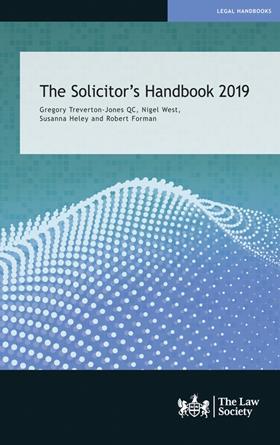The Solicitor’s Handbook 2019
Gregory Treverton-Jones QC, Nigel West, Susanna Heley and Robert Forman
£100, the Law Society
★★★★✩
Perhaps I am wrong but not many people are likely to read this book like a novel. It is primarily a book to refer to when an issue arises. But the profession also needs to know what has changed, so do not throw away last year’s edition or previous ones because past deeds will be judged by the rules then in force.
The essence of the current reform was set out in an email to the profession: ‘Our shorter, simpler standards and regulations focus on high professional standards and protecting the public. They put more trust in your professional judgement and give you more choices over how and where you work.’ Change is everywhere. We have major changes in the professional rules, including in the accounts rules.
This handbook is a comprehensive guide to all of the different regulations governing the conduct of solicitors. Written by well-known experts, it covers the regulation and authorisation of business, the SRA Principles and the SRA Code of Conduct, the SRA Accounts Rules, data protection, the regulatory system in practice, fraud and money laundering, and the regulation of alternative business structures. Not only is change in the air but regulation is a contentious topic. Pending prosecutions about alleged sexual misconduct and how these are dealt with raise serious issues for the profession.
There has been plenty of change over the years. In 1960, the Guide to the Professional Conduct of Solicitors was published. That short document, was replaced by the ‘vast’ Solicitors’ Code of Conduct 2007. In 2011, ‘outcomes-focused’ regulation came in with the Principles and Code of Conduct. The profession has faced a ‘torrent of new rules and regulations’ and now we have two sets of rules: one for individuals and another for firms. The profession may be surprised at the speed of change, the aim of which is to produce rules which are simpler, shorter and easier to understand. Time will tell if less is more.
This book discusses recent, important cases, including Ivey, which clarified test for dishonesty and cases on lack of integrity. There probably is scope for further clarity. There is a new chapter on data protection. And the chapter on accounts refers to the draft new rules. As far as I can tell, the accounts rules have not yet been finalised. There is more guidance on banking facilities, but on the ever tricky subject of dormant balances we await more information from the SRA.
I have to remember I am reviewing the book not subject. I look forward to reviewing editions in the future when not much has changed for the solicitor. This book is a reliable and clear guide to an essential topic for solicitors. I think it is worth it for the obituary of Andrew Hopper QC, a writer of previous editions, who was an amazing character in this field of law. It is the people behind this subject that are important, whether it is the client or the practitioner.
David Pickup is a partner at Pickup & Scott Solicitors, Aylesbury

- Would you be interested in writing a book review for the Law Society Gazette? The Gazette receives books on a range of legal specialisms, as well as fiction, history and biography. If you are interested please write to Nicholas Goodman indicating your specialism.
































No comments yet